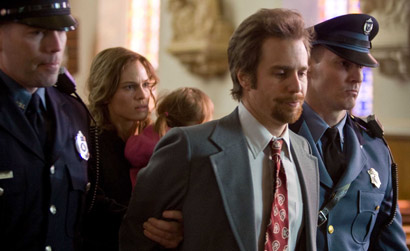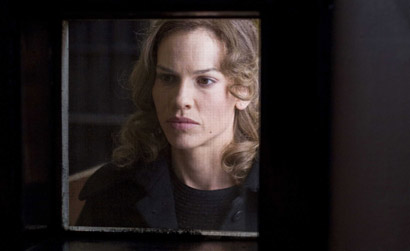
Conviction isn’t the first time the multi-talented Sam Rockwell has gotten incarcerated—starting out in 1989 as a fugitive from a locked mental ward in the Halloween horror spree Clownhouse, Sam later made his mark in The Green Mile as a condemned psycho giving Tom Hanks a hard time. But with Conviction it’s for real, as the never-less-than-surprising actor goes about filling the formidable shoes of Kenny Waters, a Massachusetts lifer wrongly convicted of homicide who spent years behind bars before being freed as a result of DNA evidence and the extraordinary intervention of his sister, Betty Anne. During this interview, Sam reveals both his serious and comical sides, as he describes immersing himself in this complex real-life character, while baring his soul—and a little bit of his body too.
Q: Would you say you’re anything like Kenny Waters?
SAM ROCKWELL: He was a bigger man! I bulked up a little and tightened my clothing so I could push my belly out in a couple of the scenes. We did talk about shaving my head like he did, but I was going to do Iron Man 2 right after this film, so I couldn’t shave my head and grow it back in time.
Q: How did you go about getting into the skin of this complicated and tragic real life character?
SR: I heard audio tapes of him, and the stories that the real-life Betty Anne told us were really informative. I also read letters he wrote in prison and I could visualize him when Bette Anne told these stories. They were very vivid. I also had tape of him talking to his lawyer about the case. Betty Anne and all her relatives told lots of stories. Then there was all the prison research; that was extensive stuff that I did on my own. He also seemed like a real charmer. That thing in the bar really happened—he took his clothes off and danced! That’s not a Hollywood addition; he was really the sort of guy who would do something like that.
Q: What did you learn about Kenny’s life in prison?
SR: The inside of the prison emotionally and the visiting room, it was very important that we feel his experience. Without that, it wouldn’t be a movie… and Hilary [Swank], her concern, and that the characters are always trying to take care of each other. They’re tough people, and very openhearted people. The one thing that’s striking is that when you’re inside, the cells are very, very small. The other thing is you’re completely open. Everybody can see you, so you have no privacy. It’s also very loud, so you do everything in front of people. It’s literally like being a caged animal, especially in the older prisons.
Q: How hard was it for you to play Kenny, knowing he died six months after being released from prison, something that is not in the film?
SR: Yeah, it was tough. It’s a bummer obviously. He was just an unlucky guy, and it’s terrible what happened. But at the same time, he died a free man. You know, the last six months of his life were awesome. He was on Oprah, and he had movie deals coming in. He loved the attention.
Q: Did you figure out while making this movie, how innocent men in prison keep up the will to survive?
SR: I talked to Betty Anne a lot about that. To keep that hope alive for so long, these guys in prison, for years, it’s a very tough thing. I think there’s a spiritual process.





